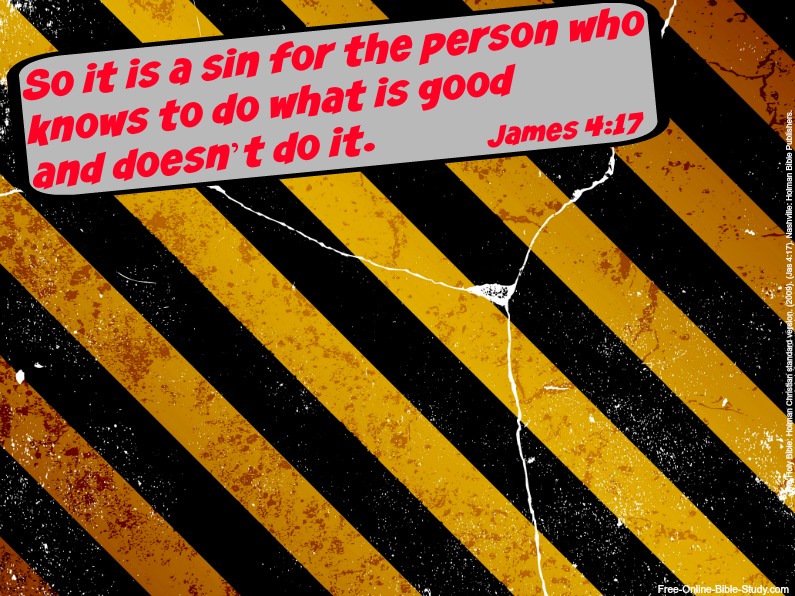- Bible Study Lessons
- James
- James Chapter 4
James Chapter 4
Welcome to the fourth of five studies on James Chapter 4.
Pride is often the greatest challenge one will face in his or her life. It's pride that causes man to focus on himself and not God. It's
pride when we yield to our carnal sinful desires and not to the will of
God. It's pride that tempts us to please ourselves and not God.
Pride is basically putting ourselves before God. We cannot
underestimate the value of a humble heart to Almighty God. Pride is the
opposite of humility. We will study both here in James Chapter 4.
Click Here to Check Out Our Bible Study on Pride
Daily Study Questions for James Chapter 4
Day One
James asks the question “What’s causing the fights and quarrels among you”?
One commentator speculated that the context may have been those fights and troublemaking among the Jews that eventually led to rebellion against Roman authority. He then speculates that it was more likely fights among families and Jewish sects. He provides an analysis that James was warning the Christian converts not to become affected by the Jewish culture of that time that was predisposed to strife. Another commentator cites evidence of the Jews in Egypt, Syria and other places the epistle would be read were killing those who were not Jewish because they would not convert to Judaism.
Perhaps a survey of the Greek words used here will help us to understand the context. According to Word Pictures in the New Testament, the Greek words for wars and fightings in the King James or fights and quarrels in the NIV are polemos and mache respectively. Polemos means the chronic state or campaign of a war while mache means the separate conflicts or battles in a war. Strong's Hebrew and Greek Dictionaries tells us the Greek word for members is melos which means a “limb” such as an arm or leg. New Testament Christians are likened to the members of the body collectively; that is, the body itself as the seat of the desires and passions (See Romans 6:13,19; Romans 7:5,23; and Colossians 3:5).
So putting this all together, we see that the probable context of the “wars” and “fightings” James speaks of are those that were occurring between and amongst the members or Christians of the early church. These Christians were members of one body who were fighting and quarreling among themselves. This was occurring thousands of years ago, but yet it still occurs even today in the Christian church.
Why can’t we stop quarrelling and fighting amongst ourselves? Why does it still continue? Will it ever stop? When?
Day Two
1. How do these ideas already provided in the first three chapters of James help the reader avoid quarreling and fighting?
- James 1:19-20
- James 2:8-9
- James 3:8
- James 3:16-18
2. In the King James Version James tells us in verse one that the wars and fighting among the believers come from their lust. He then uses the word lust as a verb in verse two and again in verse five. In verse three he says that they do not receive the things they ask for because they ask wrongly and because they would consume the things they ask for upon their lusts.
In verse one the Greek word for lust is hēdonē and means sensual pleasure, and by implication, desire. It's same word used in verse 3, but in verses 2 and 5 a different Greek word is used which denotes an intense craving or coveting for something. This same Greek word occurs in the first chapter of James where we read about lust in verses 14 and 15:
14 But every man is tempted, when he is drawn away of his own lust, and enticed. 15 Then when lust hath conceived, it bringeth forth sin: and sin, when it is finished, bringeth forth death.
What's the result of lusting or lust in the following verses?
- James Chapter 1 verse 14
- James Chapter 1 verse 15
- James Chapter 4 verse 1
- James Chapter 4 verse 2
- James Chapter 4 verse 3
- James Chapter 4 verse 5
Day Three
1. Lust and the results of lust is the theme or main idea of James Chapter 4 verses 1 through 5. What's the theme of verses 6 through 10?
2. How does the theme of lust in James Chapter 4 verses 1 through 5 relate to the theme or main idea of verses 6 through 10?
Day Four
List the commands and our results if we follow these commands from verses 7 through 10.
Day Five
1. James tells us not to slander one another in verse 11 and that when we judge our brothers or sisters we are judging the law. He says this is wrong for us to slander and judge one another.
What do the following verses help us understand about this Biblical truth?
- James 4:12
- Matthew 7:1-2
- Romans 2:1
- Romans 14:10-12
- I Corinthians 4:3-5
2. As Christians are we never to judge actions or behavior of others? Can we judge others and yet not sin? What about the judges in our civil and criminal court systems and Christians on jury duty; do they sin when carrying out these duties?
Day Six
1. What exactly is the evil James speaks of in verses 13 through 16? Why is this evil?
2. Is James saying in verse 17 that we can sin by not doing something?
Click Here to Compare Your Answers for James Chapter 4
